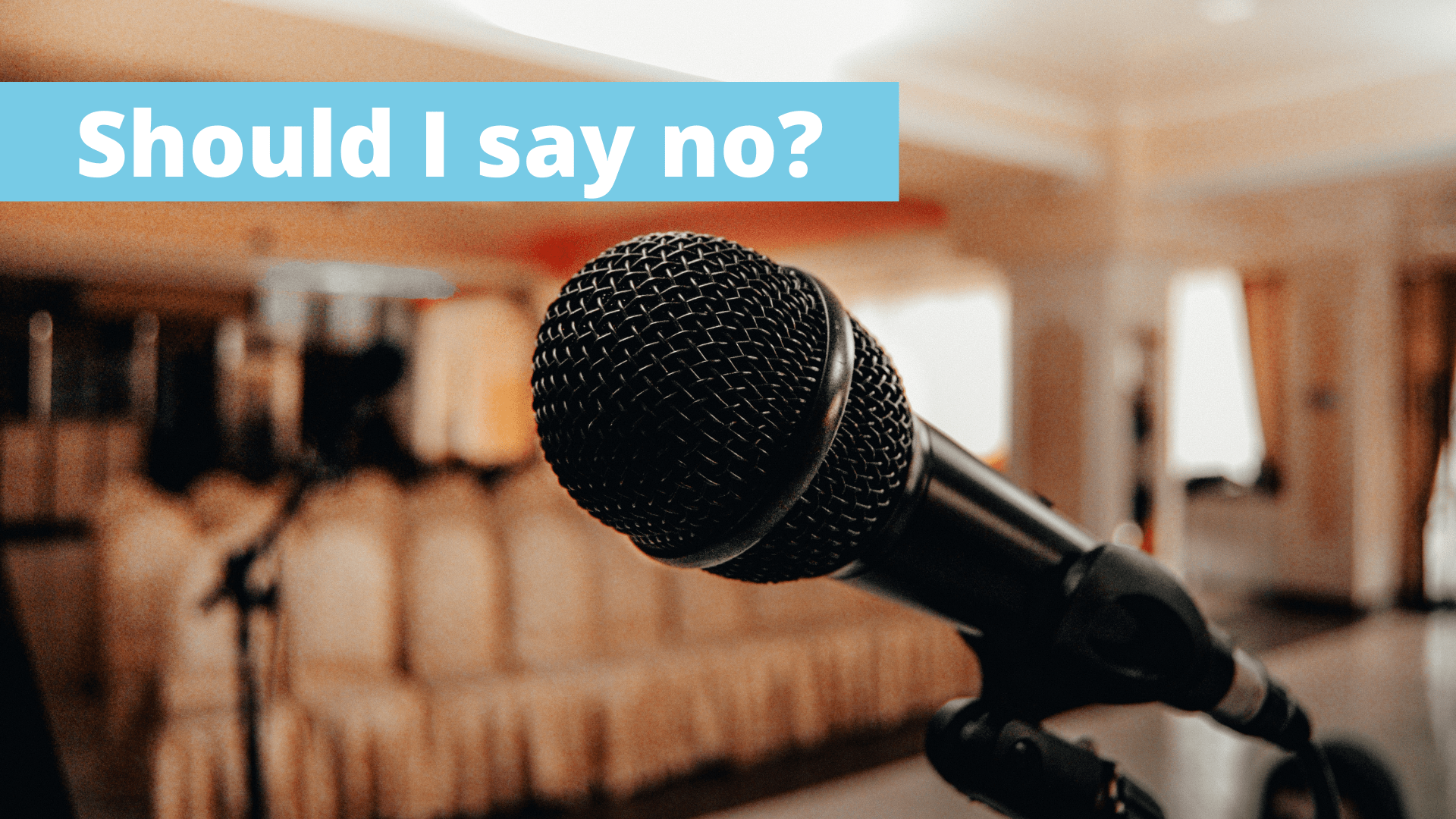We repeatedly talked about how important your public speaking skills are to evolve in your career, to reach your goals. You know you’ll never be as good as you can be if you do not practice. The best way to be a good communicator is to communicate!
Does this mean you should jump in every opportunity or invitation to give a talk? Not necessarily.
Some presentations can harm your credibility and damage your career. Consider the following points if you’re not sure you should accept an invitation.
Make sure you agree with what you’ll be defending
If the organizer wants you to defend a point of view on the topic of discussion, make sure you agree with it. Don’t go against your beliefs just to be accepted.
Your audience will feel the lack of enthusiasm; they’ll sense that something is not quite right. This can generate some suspicion, and your presentation will not be as good as it could be. Besides that, you may feel disappointed in yourself by standing up for something you don’t believe in.
Such presentation affects your credibility and your self-esteem. This in turn may impact on your next presentations, so you may want to decline such an opportunity.
Keep within your field of expertise
Talking about something you don’t know much about is nerve-wracking. Once more, you risk harming your credibility.
If you get an offer to talk about something slightly off your field of expertise, consider it carefully before you say yes. Ask yourself the following questions: Do I know enough of the matter? Who is the audience? What’s the goal of this talk?
The first question can depend on the other two. Usually, no one will invite you to talk about something that you have no idea about. Yet, the topic can be related to your field of expertise but not entirely your cup of tea. That’s when you consider the audience and the goal of the presentation.
The audience
Who is your audience? Are they experts? What do they know about your topic? What will they be expecting? Why does the organizer want you to talk about that topic with those people?
If the audience is full of experts on the topic of your presentation, then you should probably decline the invitation. The exception is if you are also an expert in the field or your presentation will be interesting because it provides complementary information to their expertise.
Now, a completely different matter is if the audience knows nothing about the topic. If that’s the case, consider this: what can my presentation give to those people? It is now the time to check the presentation goals with the organizer.
Why are you giving this presentation?
Someone invited you to talk about a particular topic to people who know nothing about it. Why? What’s the goal of the presentation?
In most cases, these presentations are a mere introduction to the topic—a general view to raise awareness. In any case, you need to make sure that you’re able to reach that goal. Also, keep in mind that your audience may have questions, some of them not so generalist. Are you able to give them proper answers?
If you think that you have something to give those people, you should accept. You will be worth their time. If you do say yes, prepare exhaustively.
You feel you are tricking the audience
This feeling is more common to happen in sales. You need to convince an audience to buy a product you don’t believe in, don’t trust, and don’t think is good enough. Yet, it is your job, so you step forward.
In fact, this is a tricky situation. If it is your job, you don’t really have a choice, except maybe trying to find a new job. In any case, it is very hard to convince your audience to do something if you feel it is wrong.
Your doubts and discomfort will affect your performance. Not to mention the ethical issues you’d be facing. This is definitely a situation to avoid.
You do not have time to prepare
This is one of the trickier arguments for declining an invitation to speak. First of all, you’ll always feel like you don’t have enough time to prepare. Second, if it is important, we find the time, right?
Sometimes, a bit of impromptu is not a problem. It can actually make your speech sounds more natural, as long as you have a structure of what to talk about in your head. Of course, this only works if you know the topic very well.
Instead of jumping on “I don’t have the time.” as an excuse, focus on how well you know the presentation topic and use every second you have to work on it. Find a balance that helps you not to waste opportunities.
How to decline the invitation?
After you make your decision to say no, there is a second problem. How to decline it?
An invitation to a presentation is an opportunity for you, and it can be challenging to find the words to say ‘no’. Assertiveness is the key in any situation. Be respectful and thoughtful, but clear about your decision.
When it’s time to say no
There will be a moment when you need to decline an invitation. The reasons this may happen are countless. You need to evaluate the situation very clearly to make sure that you’re making the right decision.
Try to be as objective as possible. Are your reasons valid? Or are they just excuses promoted by your fear of speaking in public?
Consider your possibilities and be clear and assertive when giving your answer. Make sure they understand that your answer is exclusively for that occasion and you’re open to futures opportunities.
Cátia is a psychologist who is passionate about helping children develop and train social skills.



Leave a Reply